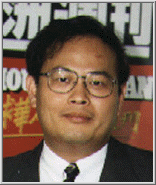YING CHAN AND SHIEH CHUNG-LIANG, U.S. correspondent and contributing editor, and Taiwan bureau chief, respectively, of the Hong Kong magazine Yazhou Zhoukan (Asia Week), were the first journalists to point the way toward the role of Taiwan money in the unfolding investigation into Asian influence on U.S. elections. With Chan investigating the U.S. angle and Shieh reporting in Taiwan, the two wrote an article published Oct. 25, 1996, reporting that Liu Tai-ying, the powerful business manager of the Kuomintang (KMT) party, had offered $15 million to the Clinton re-election campaign in a meeting with a former White House aide.
Their story exposed a sensitive nerve in Taiwanese ruling circles that soon landed them in court. Liu Tai-ying, who controls a KMT business empire estimated at $3 billion, denied that he had made the offer. He sued the reporters and the magazine for criminal libel in a case that for many observers called into question Taiwan’s commitment to democracy and became a test case for press freedom in Asia. At stake was a possible two-year jail term and civil damages of $15 million.
Chan, who was born in Hong Kong and came to the United States in 1972 to do graduate work at the University of Michigan at Ann Arbor, is an American citizen. Nevertheless, she was determined to go to Taiwan to stand with her colleague and answer the charges and risk going to jail. Using skills acquired as a Nieman Fellow at Harvard in 1995, she created a Web site on the case and worked tirelessly to inform an international audience about the libel action. Veteran journalist Shieh, who holds a master’s degree from the University of Minnesota, did the difficult reporting on the KMT in his own country. He broke the story with full awareness of the risk he was taking.
The publisher and editor of Yazhou Zhoukan, to their credit, supported their reporters and refused to settle the suit out of court. On April 22, a Taiwanese district court ruled in favor of Ying Chan and Shieh Chung-liang, accepting arguments made in an amicus brief filed on behalf of the defendants by CPJ and ten major U.S. media companies. The acquittal has been widely hailed as a major victory for freedom of the press in Asia. While Liu Tai-ying has appealed the decision, Chan and Shieh have proven themselves worthy defenders of the finest traditions of press freedom. Their courage sets an example in a region noted for both widespread self-censorship and government intervention in the functioning of the press.
|
Background
Taiwan, November 7, 1996
Ying Chan, Free-lancer LEGAL ACTION
Shieh Chung-liang, Yazhou Zhoukan LEGAL ACTION
Lui Tai-ying, director of the Business Management Committee of Taiwan’s ruling Kuomintang, filed a criminal libel suit against Chan, an American journalist who writes for the Daily News of New York, and Shieh, senior editor of the Hong Kong-based Yazhou Zhoukan (Asia Weekly). The suit stemmed from an article in the Oct. 25 edition of Yazhou Zhoukan that alleged that during an August 1995 meeting with former White House staffer Mark Middleton, Lui had offered to donate US$15 million to the Democratic National Committee for U.S. President Clinton’s re-election campaign.
If convicted, Chan and Shieh face up to two years in jail. Lui’s decision to sue the reporters has been defended by senior members of the Kuomintang. CPJ sent a letter to President Lee Teng-hui condemning the use of seditious libel suits and calling on his government to openly dissociate itself from Lui’s suit. CPJ also urged Lee to ensure that no government or Kuomintang resources are used in the suit.
|CPJ home | Attacks Index | Awards 1997 |Report a Journalist in Trouble |